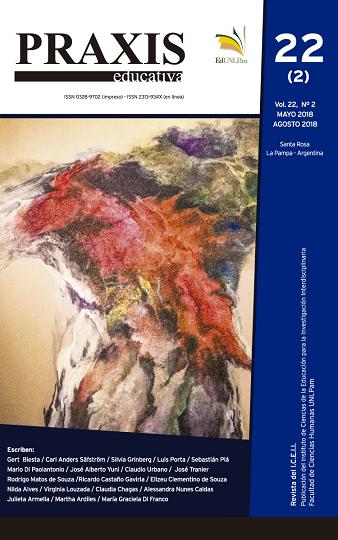¿Puede el propio pensamiento de educación romper esquemas? Análisis de “Un Manifiesto para la Educación” de Biesta y Säfström / Can the very thought of education break bricks? A Commentary on Biesta and Säfström’s ‘A Manifesto for Education’
DOI:
https://doi.org/10.19137/praxiseducativa-2018-220206Palavras-chave:
Manifiesto para la educación, pensamiento de educación, idealidad, tensión temporalResumo
El presente texto intenta reflexionar sobre la potencialidad misma del pensamiento de educación en lo que refiere a la resignificación de esquemas a partir de la lectura de “Un Manifiesto para la educación”. Dicho manifiesto puede ser entendido como una idealidad adolescente, la cual no sólo comienza, sino también siempre finalizará en desilusión –en este mal de la idealidad. La idealidad que persigue todo manifiesto puede conllevar a la inmovilidad y a la decepción, sin siquiera intentar romper esquemas estructurantes. El artículo que se presenta intentará abordar dicha cuestión a partir de nuestros propios pensamientos respecto a la crítica de la idealidad y de las reflexiones que invita a realizar el manifiesto en cuestión. De alguna manera nos otorga la posibilidad pensar y pensarnos educativamente. ¿Pero qué significa eso exactamente? Para alcanzar el significado del pensar lo educativo necesitamos considerar qué está implícito al sostener “lo que es” y “lo que no es” en tensión. De ello se abocará el último apartado del trabajo.
Downloads
Referências
Biesta, G. y Säfstrom, C.A. (2011). A Manifiesto for Education. Policy Futures in Education Año. 9 Nº 5, pp.540-547
Biesta, Gert (2014). Beautiful Risk of Education.. Boulder: Paradigm Publishers.
Britzman, Deborah (2015). A psychoanalyst in the classroom: On the human condition in education. New York: SUNY Press.
Derrida, Jacques (1991). “This is Not an Oral Footnote,” in Annotation and Its Texts, ed. Stephen A. Barney. Oxford: Oxford University Press, 1991, 192-205.
Kristeva, Julia (2011). This Incredible Need to Believe. New York: Columbia University Press.
Kristeva, Julia (2006). “Thinking in dark times,” Profession, no. 1, 13-21.
Rogoff, Irit (2010). “Turning,” in Curating and the Educational Turn. Eds. Paul O’Neill and Mick Wilson. Amsterdam: de Appel/Open Editions, 32-46.
Downloads
Publicado
Edição
Seção
Licença
Aviso de direitos autorais
Comitê Editorial Revista Práxis Educativa:
Declaro que sou o autor do artigo intitulado (nome do artigo), que o mesmo é original e de minha autoria e que não foi publicado anteriormente em qualquer outro formato ou meio. Declaro saber que a revista não me cobrará nenhum tipo de taxa em hipótese alguma, nem receberei qualquer tipo de remuneração monetária.
Caso seja aceito para publicação na Práxis Educacional, autorizo a referida revista a publicá-lo digitalmente e a divulgá-lo em suas redes sociais.
Se o trabalho for publicado, aderi à licença Creative Commons denominada "Atribuição - Compartilhamento Não Comercial pela mesma Licença CC BY-NC-SA", por meio da qual é permitido copiar, reproduzir, distribuir, comunicar publicamente o trabalho e gerar trabalhos derivados , desde que o autor original seja citado e reconhecido. Esta licença está em uso desde setembro de 2018. Em 2016 foi aderido ao CC BY NC ND 4.0; e nos anos de 2017 e 2018 (janeiro-agosto) CC BY NC 4.0.
Esta licença CC BY-NC-SA Share Alike não permite, entretanto, o uso comercial da obra. Como autor, a revista poderá estabelecer acordos adicionais para a distribuição não exclusiva da versão do trabalho publicado na revista, permite-me autoarquivar os artigos publicados, na sua versão post-print, em repositórios institucionais, temáticos , páginas web pessoais ou qualquer outro uso relevante. com o reconhecimento de ter sido publicado pela primeira vez nesta revista.
SA Práxis Educacional adere à DORA (Declaração sobre Avaliação de Pesquisa) assinada em São Francisco, Califórnia, em 16 de dezembro de 2012, e à Declaração do México (Declaração Conjunta LATINDEX - REDALYC - CLACSO - IBICT).















_(1)2.png)


3.png)











_(2).png)






2.jpg)









